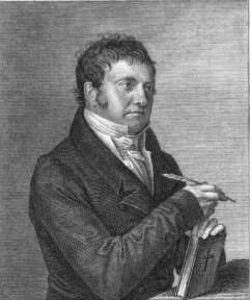Sparks from heaven
(Poet's title: Himmelsfunken)
Set by Schubert:
D 651
[February 1819]
Der Odem Gottes weht,
Still wird die Sehnsucht wach;
Das trunkne Herz vergeht
In wundersüßem Ach!
Wie löst sich äthermild
Der Erde schweres Band,
Die heil’ge Träne quillt,
Ach! nach des Himmels Land.
Wie mächtig hebt das Herz
Sich zu den blauen Höhn.
Was macht vor süßem Schmerz
Es, ach! so zart vergehn?
O süßer Hochgenuss!
Mild, wie des Himmels Tau,
Winkt Gottes Feiergruß
Hoch aus dem stillen Blau!
Und das verwaiste Herz
Vernimmt den stillen Ruf
Und sehnt sich heimatwärts
Zum Vater, der es schuf.
God’s breath is stirring!
Longing is quietly waking up;
The drunken heart swoons
In a wonderfully sweet groan!
Gently as ether, how it escapes
From the heavy ties of earth,
The sacred tears swell up,
Oh, longing for the land of heaven.
How powerfully the heart rises
Up towards the blue heights!
But why does this sweet pain make it
Swoon so tenderly, oh why? –
Oh sweet lofty delight!
Gently, like heavenly dew,
God’s welcome gesture calls out
From high in the quiet blue!
And the orphaned heart
Responds to the quiet call,
And feels a longing in the direction of home,
Towards the father who created it!
All translations into English that appear on this website, unless otherwise stated, are by Malcolm Wren. You are free to use them on condition that you acknowledge Malcolm Wren as the translator and schubertsong.uk as the source. Unless otherwise stated, the comments and essays that appear after the texts and translations are by Malcolm Wren and are © Copyright.
☙
Themes and images in this text:
Blue Breath and breathing Dew The earth Ether Father and child Fire Hearts Heaven, the sky Home (Heimat) Knots and bonds Longing and yearning Noise and silence Pain Sweetness Tears and crying
Silbert’s title, Himmelsfunken, seems to anticipate the more modern usage of the term Funken (literally, sparks) to refer to broadcasting. The sensitive heart is receptive to a message beamed through the ether from the blue heights of the sky (or heaven – ‘Himmel’ can refer to either or both), reminding us orphans of earth that a father is waiting for us in our true homeland.
Silbert’s poetry is clearly influenced by his devotion to Redemptorism, a Catholic missionary movement, but it is also in tune with more recent literary trends, in particular the Romantic concern with longing and yearning. Silbert’s Catholicism appears to omit or overlook the theme of sin and the need for grace to be mediated by the sacraments of the church; he chooses rather to emphasise the universal experience of dislocation and the yearning to settle in a loving, stable home. The sparks of heavenly truth are radiating throughout the world, and even secular Romantic poetry conveys the same message: the heart should rise up to meet the God that created it.
☙
Original Spelling Himmelsfunken Der Odem Gottes weht! Still wird die Sehnsucht wach; Das trunkne Herz vergeht In wundersüßem Ach! Wie löst sich äthermild Der Erde schweres Band, Die heil'ge Thräne quillt, Ach! nach des Himmels Land. Wie mächtig hebt das Herz Sich zu den blauen Höh'n! Was macht vor süßem Schmerz Es ach! so zart vergehn? - O süßer Hochgenuß! Mild, wie des Himmels Thau, Winkt Gottes Feyergruß Hoch aus dem stillen Blau! Und das verwaiste Herz Vernimmt den stillen Ruf, Und sehnt sich heimathwärts Zum Vater, der es schuf!
Confirmed by Peter Rastl with Schubert’s source, Die heilige Lyra. Von Johannes Petrus Silbert. Wien, 1819. Gedruckt bey Anton Strauß, pages 214-215.
To see an early edition of the text, go to page 214 [228 von 260] here: http://digital.onb.ac.at/OnbViewer/viewer.faces?doc=ABO_%2BZ170651306


